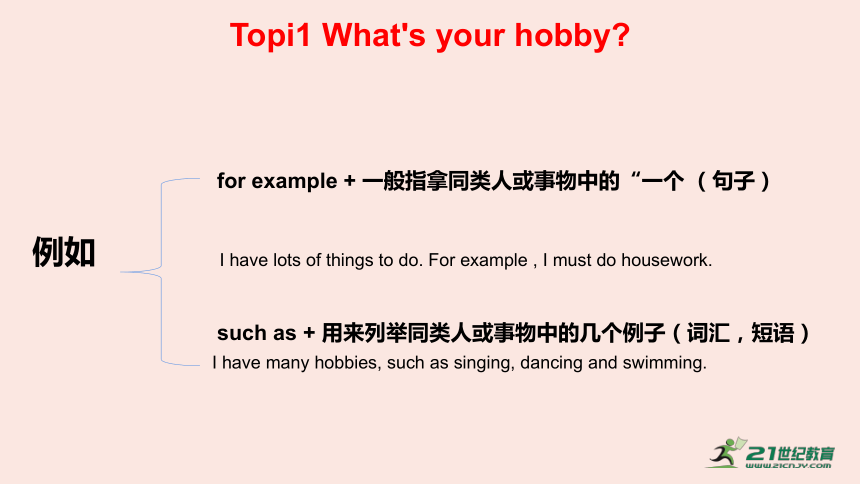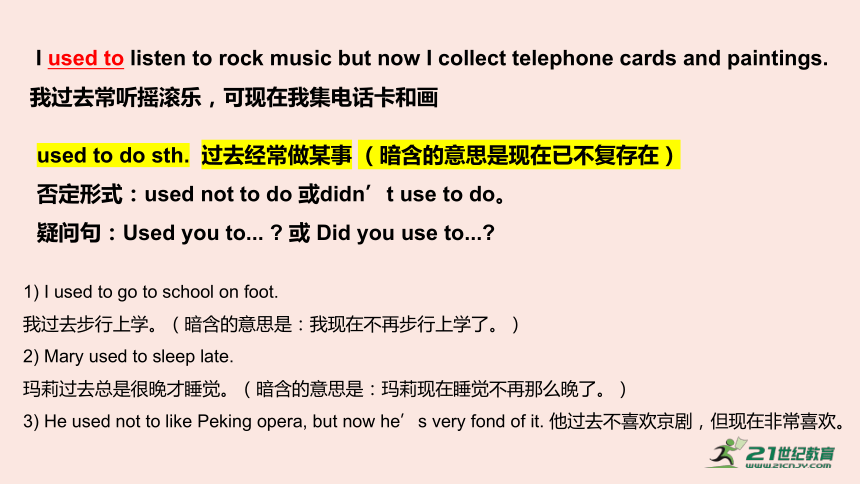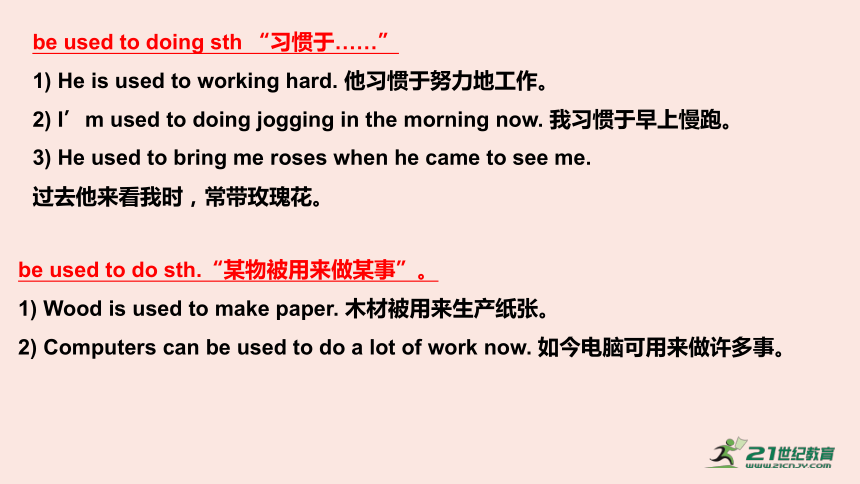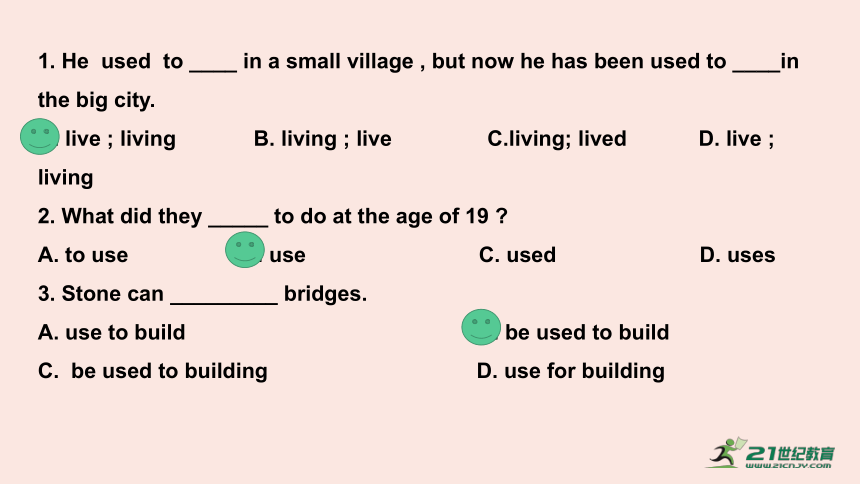Unit 3 Our Hobbies 考点精析 课件
文档属性
| 名称 | Unit 3 Our Hobbies 考点精析 课件 |  | |
| 格式 | pptx | ||
| 文件大小 | 242.6KB | ||
| 资源类型 | 试卷 | ||
| 版本资源 | 仁爱科普版 | ||
| 科目 | 英语 | ||
| 更新时间 | 2023-09-08 17:08:20 | ||
图片预览









文档简介
(共20张PPT)
Unit3 Our Hobbies
---考点精析
Topi1 What's your hobby
例如
such as + 用来列举同类人或事物中的几个例子(词汇,短语)
for example + 一般指拿同类人或事物中的“一个 (句子)
I have lots of things to do. For example , I must do housework.
I have many hobbies, such as singing, dancing and swimming.
I used to listen to rock music but now I collect telephone cards and paintings.
我过去常听摇滚乐,可现在我集电话卡和画
used to do sth. 过去经常做某事 (暗含的意思是现在已不复存在)
否定形式:used not to do 或didn’t use to do。
疑问句:Used you to... 或 Did you use to...
1) I used to go to school on foot.
我过去步行上学。(暗含的意思是:我现在不再步行上学了。)
2) Mary used to sleep late.
玛莉过去总是很晚才睡觉。(暗含的意思是:玛莉现在睡觉不再那么晚了。)
3) He used not to like Peking opera, but now he’s very fond of it. 他过去不喜欢京剧,但现在非常喜欢。
be used to doing sth “习惯于……”
1) He is used to working hard. 他习惯于努力地工作。
2) I’m used to doing jogging in the morning now. 我习惯于早上慢跑。
3) He used to bring me roses when he came to see me.
过去他来看我时,常带玫瑰花。
be used to do sth.“某物被用来做某事”。
1) Wood is used to make paper. 木材被用来生产纸张。
2) Computers can be used to do a lot of work now. 如今电脑可用来做许多事。
1. He used to ____ in a small village , but now he has been used to ____in the big city.
A. live ; living B. living ; live C.living; lived D. live ; living
2. What did they _____ to do at the age of 19
A. to use B. use C. used D. uses
3. Stone can _________ bridges.
A. use to build B. be used to build
C. be used to building D. use for building
interest
V. 使产生兴趣
n. 兴致,兴趣
adj. interested 某人感到有趣的; interesting 令人感到有趣的
be interested in 对……感兴趣
be interested to do sth “对做某事感兴趣”
1.—We all like Mr. Wang.
—I agree with you. He always makes his English classes________ .
A. interested B.interest C. interesting
2.Mr.Wang is an _______ man .He is __________ in telling jokes .
A. interesting , interested B. interested ,interesting
C. interesting , interesting D. interested ,interested
3.It was______to learn about the Wolong Panda Reserve.
A. interesting B. interest C. interested D. interested
He doesn’t mind whether they’re good or not. 他并不介意它们是否是好的。
此句为以whether引导的宾语从句。whether...or not“不论是否……”
位于谓语动词后面的句子
You have to get up early everyday whether it rains or not.
if与whether的区别:
二者在引导宾语从句时一般可换用。如:
1) I want to know if / whether it is going to rain tomorrow. 我想知道明天是否下雨。
2) He asked me if / whether Li Ping was at home. 他问我李平是否在家。
3) He didn’t understand if / whether the stranger told a lie. 他不明白那个陌生人是否说的是假话。
但下列几种情况不能换用。
1) whether 后可紧接or not,而if一般不能。
Let me know whether or not you can come. 你能来还是不能来,请告诉我一声。
2) 不定式前用whether,不用if。如:
I haven’t decided whether to go to the cinema or to stay at home.
我还没有决定是看电影还是留在家里。
3) 介词后可用whether,不用if。如:
I haven’t settled the question of whether I’ll go back home. 我是否回家还没有定。
1. Let me know _____ or not you can come.
A. what B. whether C. that D. if
2. His father is worried ahout ______ he wil lose his job.
A. that B. if C. whether D. how
He hasn’t decided______ to go to the cinema or to stay at home.
A.if B. what C. whether D. how
Topic2 What sweet music
be ( was, were ) born
in
地点
年、月,季节
on 具体到某年某月某日;j具体某一天;星期
1. He _____ born _____ 1997.
A. was ; on B.were ; in C. was ; in
2. I was born ____ Guangzhou.
A. at B. in C.on
3. They ____ born ____ cold night.
A. were ; in B. was; on C. were ; on
for “因/由于....而闻名” 后一般跟事物(作品,,技能,特产)
be famous
as 做为某职业、身份 ; ( 地位,名胜古迹) 而闻名”
1.Lu Xun is famous as a great writer.
Lu Xun is famous for his great novels.
2.Wenxian has been famous as a place producing green tea.
Wenxian has been famous for its green tea.
1. He is famous ____ a doctor.
A. as B. for C. at
2. Mr.Lin is famous _____ his skill in playing football.
A. for B. to C. as
3. The area is famous ____ its green tea .
A. to B. for C. as
look for 表示寻找的过程,意思是还没找到
I am looking for my umbrella.(我正在找我的雨伞。)
find 表示寻找的结果,意思是已经找到了。
I didn't find my book at last.最后,我还是没有找到我的书。
find out 主要指“查明一个事实真相,找出不容易被发现的东西”
They have find out what was wrong. 他们已经搞明白什么出了问题。
search for 就是要做研究,做调查,才能找到方法或结果
The police are searching for the missing person. (警方正在搜索那个失踪的人。)
寻找
1. She is __________ her missing dog.
A.finding B. searching for C. looks for D. looking for
2. Did you _____ your books?
A. search for B. find C. look for D. find out
3. Can you _______ who has lost the watch
A. find B. look for C. find out D. search for
感叹句
What + a/ an+ 形容词 + 名词单数+ (主语+ 谓语) !
What + 形容词 + 名词复数+ (主语+ 谓语) !
What + 形容词 + 不可数名词+ (主语+ 谓语) !
How + 形容词 + (主语+ 谓语) !
How + 副词+ (主语+ 谓语) !
形后无名选用 How
形后有名就用 What
1. _______ stupid question!
A. What an B. What a C. What D. How a
2. _______ wonderful it is !
A. What B. What a C.How D. How a
3. _________ active boy he is !
A.How an B. What an C. What D. What a
4. ________ delicious apples they are !
A. What B. What a C.How a D. How
5. ______ clean water !
A. What a B. What an C.How D. What
Topic3 What were you doing at this time yesterday
agree
agree with sb/ sth . 与某人看法一致 涉及意思、想法、分析、解释以及涉及人
They might not agree with his opinions. 他们可能不同意他的意见
agree on 要确定一样事情
Can we agree on a date for the next meeting 我们能不能为下次会议确定一个时间?
agree to 涉及一件建议或计划。
He’s agreed to our suggestion about the holiday.
他已经同意我们关于假日的计划了。
1. We agreed ______ the project at last.
A. at B. with C. about D. on
2. Do you agree _____ this plan
A. to B. with C. on D. about
3. He didn’t agree ______ me.
A. at B. on C. with D. about
4. They agreed____ our suggestion about the party .
A. to B. with C. about D. at
太…..以至于不能......
too ...... to
It’s too hot to go out, now.
so......that + 句子
It’s to cold that we can’t go swimming.
not + 形容词 enough to do
He is not old enough to go to school.
译一 译
我妹妹太小了还不能上学.
1.My sister is too young to go to school.
2.My sister is so young that she can’t go to school.
3.My sister is not old enough to go to school.
过去进行时
2. 过去进行时由be (was/were)+动词ing 形式构成的
肯定句:主语+was/were +doing +…
否定句:主语+wasn’t/weren’t +doing +…
一般疑问句:Was/Were+主语+doing+…
肯定回答:Yes, 主语+was/were.
否定回答:No, 主语+wasn’t/weren’t.
1. 过去进行时表示过去某一时刻正在进行或发生的动作,也表示过去一段时间内的活动或那个阶段正在进行的动作。
标志词:at that moment ; when, while; at that time
1. —What was your father doing when we were at the cinema yesterday evening
—He ________ my bicycle at home at that time.
A.fixes up B.fixed up C.would fix up D.was fixing up
2. They __________ English at this time yesterday.
A. study B. studies C. studying D. were studying
3. He _____ at that time.
A. reads B. is reading C. was reading D. read
4. The children ________________ when their mother came.
A. are watching TV B. were watching TV
C. watch TV D. watched TV
Thank you
Unit3 Our Hobbies
---考点精析
Topi1 What's your hobby
例如
such as + 用来列举同类人或事物中的几个例子(词汇,短语)
for example + 一般指拿同类人或事物中的“一个 (句子)
I have lots of things to do. For example , I must do housework.
I have many hobbies, such as singing, dancing and swimming.
I used to listen to rock music but now I collect telephone cards and paintings.
我过去常听摇滚乐,可现在我集电话卡和画
used to do sth. 过去经常做某事 (暗含的意思是现在已不复存在)
否定形式:used not to do 或didn’t use to do。
疑问句:Used you to... 或 Did you use to...
1) I used to go to school on foot.
我过去步行上学。(暗含的意思是:我现在不再步行上学了。)
2) Mary used to sleep late.
玛莉过去总是很晚才睡觉。(暗含的意思是:玛莉现在睡觉不再那么晚了。)
3) He used not to like Peking opera, but now he’s very fond of it. 他过去不喜欢京剧,但现在非常喜欢。
be used to doing sth “习惯于……”
1) He is used to working hard. 他习惯于努力地工作。
2) I’m used to doing jogging in the morning now. 我习惯于早上慢跑。
3) He used to bring me roses when he came to see me.
过去他来看我时,常带玫瑰花。
be used to do sth.“某物被用来做某事”。
1) Wood is used to make paper. 木材被用来生产纸张。
2) Computers can be used to do a lot of work now. 如今电脑可用来做许多事。
1. He used to ____ in a small village , but now he has been used to ____in the big city.
A. live ; living B. living ; live C.living; lived D. live ; living
2. What did they _____ to do at the age of 19
A. to use B. use C. used D. uses
3. Stone can _________ bridges.
A. use to build B. be used to build
C. be used to building D. use for building
interest
V. 使产生兴趣
n. 兴致,兴趣
adj. interested 某人感到有趣的; interesting 令人感到有趣的
be interested in 对……感兴趣
be interested to do sth “对做某事感兴趣”
1.—We all like Mr. Wang.
—I agree with you. He always makes his English classes________ .
A. interested B.interest C. interesting
2.Mr.Wang is an _______ man .He is __________ in telling jokes .
A. interesting , interested B. interested ,interesting
C. interesting , interesting D. interested ,interested
3.It was______to learn about the Wolong Panda Reserve.
A. interesting B. interest C. interested D. interested
He doesn’t mind whether they’re good or not. 他并不介意它们是否是好的。
此句为以whether引导的宾语从句。whether...or not“不论是否……”
位于谓语动词后面的句子
You have to get up early everyday whether it rains or not.
if与whether的区别:
二者在引导宾语从句时一般可换用。如:
1) I want to know if / whether it is going to rain tomorrow. 我想知道明天是否下雨。
2) He asked me if / whether Li Ping was at home. 他问我李平是否在家。
3) He didn’t understand if / whether the stranger told a lie. 他不明白那个陌生人是否说的是假话。
但下列几种情况不能换用。
1) whether 后可紧接or not,而if一般不能。
Let me know whether or not you can come. 你能来还是不能来,请告诉我一声。
2) 不定式前用whether,不用if。如:
I haven’t decided whether to go to the cinema or to stay at home.
我还没有决定是看电影还是留在家里。
3) 介词后可用whether,不用if。如:
I haven’t settled the question of whether I’ll go back home. 我是否回家还没有定。
1. Let me know _____ or not you can come.
A. what B. whether C. that D. if
2. His father is worried ahout ______ he wil lose his job.
A. that B. if C. whether D. how
He hasn’t decided______ to go to the cinema or to stay at home.
A.if B. what C. whether D. how
Topic2 What sweet music
be ( was, were ) born
in
地点
年、月,季节
on 具体到某年某月某日;j具体某一天;星期
1. He _____ born _____ 1997.
A. was ; on B.were ; in C. was ; in
2. I was born ____ Guangzhou.
A. at B. in C.on
3. They ____ born ____ cold night.
A. were ; in B. was; on C. were ; on
for “因/由于....而闻名” 后一般跟事物(作品,,技能,特产)
be famous
as 做为某职业、身份 ; ( 地位,名胜古迹) 而闻名”
1.Lu Xun is famous as a great writer.
Lu Xun is famous for his great novels.
2.Wenxian has been famous as a place producing green tea.
Wenxian has been famous for its green tea.
1. He is famous ____ a doctor.
A. as B. for C. at
2. Mr.Lin is famous _____ his skill in playing football.
A. for B. to C. as
3. The area is famous ____ its green tea .
A. to B. for C. as
look for 表示寻找的过程,意思是还没找到
I am looking for my umbrella.(我正在找我的雨伞。)
find 表示寻找的结果,意思是已经找到了。
I didn't find my book at last.最后,我还是没有找到我的书。
find out 主要指“查明一个事实真相,找出不容易被发现的东西”
They have find out what was wrong. 他们已经搞明白什么出了问题。
search for 就是要做研究,做调查,才能找到方法或结果
The police are searching for the missing person. (警方正在搜索那个失踪的人。)
寻找
1. She is __________ her missing dog.
A.finding B. searching for C. looks for D. looking for
2. Did you _____ your books?
A. search for B. find C. look for D. find out
3. Can you _______ who has lost the watch
A. find B. look for C. find out D. search for
感叹句
What + a/ an+ 形容词 + 名词单数+ (主语+ 谓语) !
What + 形容词 + 名词复数+ (主语+ 谓语) !
What + 形容词 + 不可数名词+ (主语+ 谓语) !
How + 形容词 + (主语+ 谓语) !
How + 副词+ (主语+ 谓语) !
形后无名选用 How
形后有名就用 What
1. _______ stupid question!
A. What an B. What a C. What D. How a
2. _______ wonderful it is !
A. What B. What a C.How D. How a
3. _________ active boy he is !
A.How an B. What an C. What D. What a
4. ________ delicious apples they are !
A. What B. What a C.How a D. How
5. ______ clean water !
A. What a B. What an C.How D. What
Topic3 What were you doing at this time yesterday
agree
agree with sb/ sth . 与某人看法一致 涉及意思、想法、分析、解释以及涉及人
They might not agree with his opinions. 他们可能不同意他的意见
agree on 要确定一样事情
Can we agree on a date for the next meeting 我们能不能为下次会议确定一个时间?
agree to 涉及一件建议或计划。
He’s agreed to our suggestion about the holiday.
他已经同意我们关于假日的计划了。
1. We agreed ______ the project at last.
A. at B. with C. about D. on
2. Do you agree _____ this plan
A. to B. with C. on D. about
3. He didn’t agree ______ me.
A. at B. on C. with D. about
4. They agreed____ our suggestion about the party .
A. to B. with C. about D. at
太…..以至于不能......
too ...... to
It’s too hot to go out, now.
so......that + 句子
It’s to cold that we can’t go swimming.
not + 形容词 enough to do
He is not old enough to go to school.
译一 译
我妹妹太小了还不能上学.
1.My sister is too young to go to school.
2.My sister is so young that she can’t go to school.
3.My sister is not old enough to go to school.
过去进行时
2. 过去进行时由be (was/were)+动词ing 形式构成的
肯定句:主语+was/were +doing +…
否定句:主语+wasn’t/weren’t +doing +…
一般疑问句:Was/Were+主语+doing+…
肯定回答:Yes, 主语+was/were.
否定回答:No, 主语+wasn’t/weren’t.
1. 过去进行时表示过去某一时刻正在进行或发生的动作,也表示过去一段时间内的活动或那个阶段正在进行的动作。
标志词:at that moment ; when, while; at that time
1. —What was your father doing when we were at the cinema yesterday evening
—He ________ my bicycle at home at that time.
A.fixes up B.fixed up C.would fix up D.was fixing up
2. They __________ English at this time yesterday.
A. study B. studies C. studying D. were studying
3. He _____ at that time.
A. reads B. is reading C. was reading D. read
4. The children ________________ when their mother came.
A. are watching TV B. were watching TV
C. watch TV D. watched TV
Thank you
同课章节目录
- Unit 1 Playing Sports
- Topic 1 I'm going to play basketball.
- Topic 2 I'll kick you the ball again.
- Topic 3 The school sports meet is coming.
- Unit 2 Keeping Healthy
- Topic 1 You should brush your teeth twice a day.
- Topic 2 I must ask him to give up smoking.
- Topic 3 Must we exercise to prevent the flu?
- Unit 3 Our Hobbies
- Topic 1 What's your hobby?
- Topic 2 What sweet music!
- Topic 3 What were you doing at this time yesterday
- Unit 4 Our World
- Topic 1 What's the strongest animal on the farm?
- Topic 2 How can we protect ourselves from the eart
- Topic 3 The Internet makes the world smaller.
